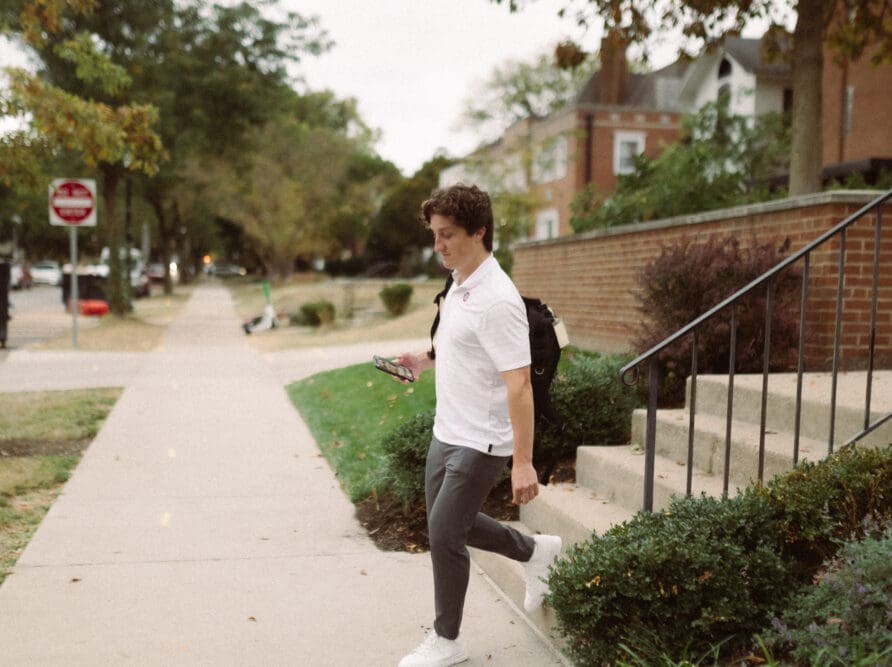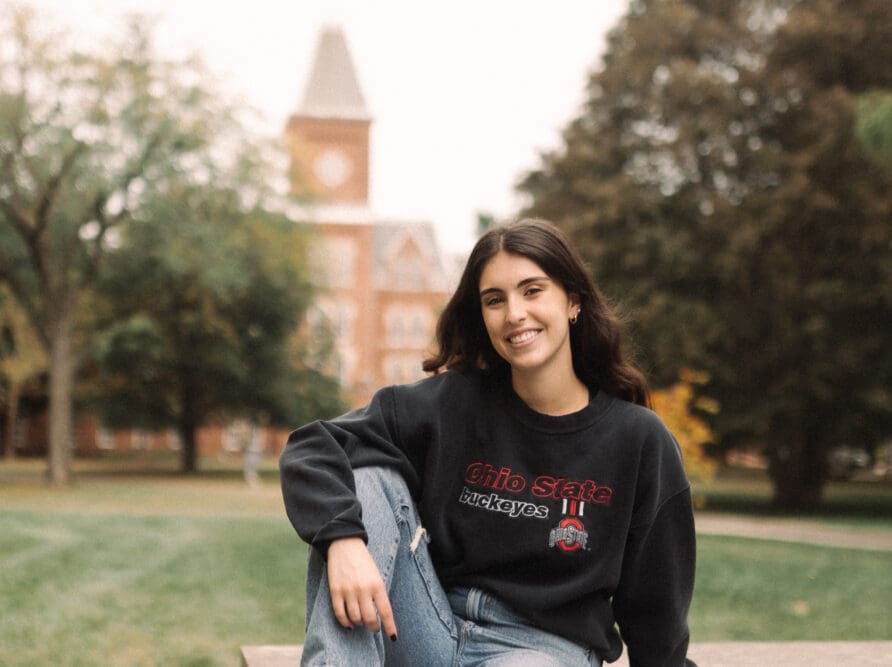Are you considering living in a student housing apartment complex near Ohio State University? At Rambler, we understand the stress that can come with finding a new place to live, especially as a student.
Finding the perfect student housing apartment can be a challenge, but by doing your research and asking the right questions, you can find a place that you’ll love calling home. That’s why we’ve created a list of 15 questions to ask when touring a student apartment near Ohio State University.
Questions to Ask When Touring a Student Apartment Near OSU
1. What are the specific lease terms?
Lease agreements can be long and complex, so it’s important to understand the key terms before you sign. This includes the start and end dates of your lease, the number of months it will last, and when move-in is. You may also want to inquire about other common lease terms that don’t initially come to mind. Things to look for include:
- Quiet hours
- Restrictions on putting holes in the walls (think hanging pictures or installing shelves)
- Subleasing policy
- Pet policy
- Late fee policy
- Parking accommodations
- Additional expenses
2. What is included in my monthly rental rate?
It is important to note what your apartment complex includes in your monthly rental rate.
- Utilities: Typically, utilities will be a separate charge, but at some apartments, it is included in the monthly rental rate.
- Water: Water is commonly factored into monthly rental rates, but it is sometimes paid for by the tenant at student housing apartments.
- Wi-Fi: Wi-Fi is typically included in the monthly rental rate at most student housing apartment complexes, but this is usually not the case at traditional apartments.
- Cable: Most student housing apartment complexes in North Campus include cable in your monthly rental rate.
- Trash: Student housing apartments typically include trash service, but sometimes at an additional cost, so be sure to clarify with your apartment complex.
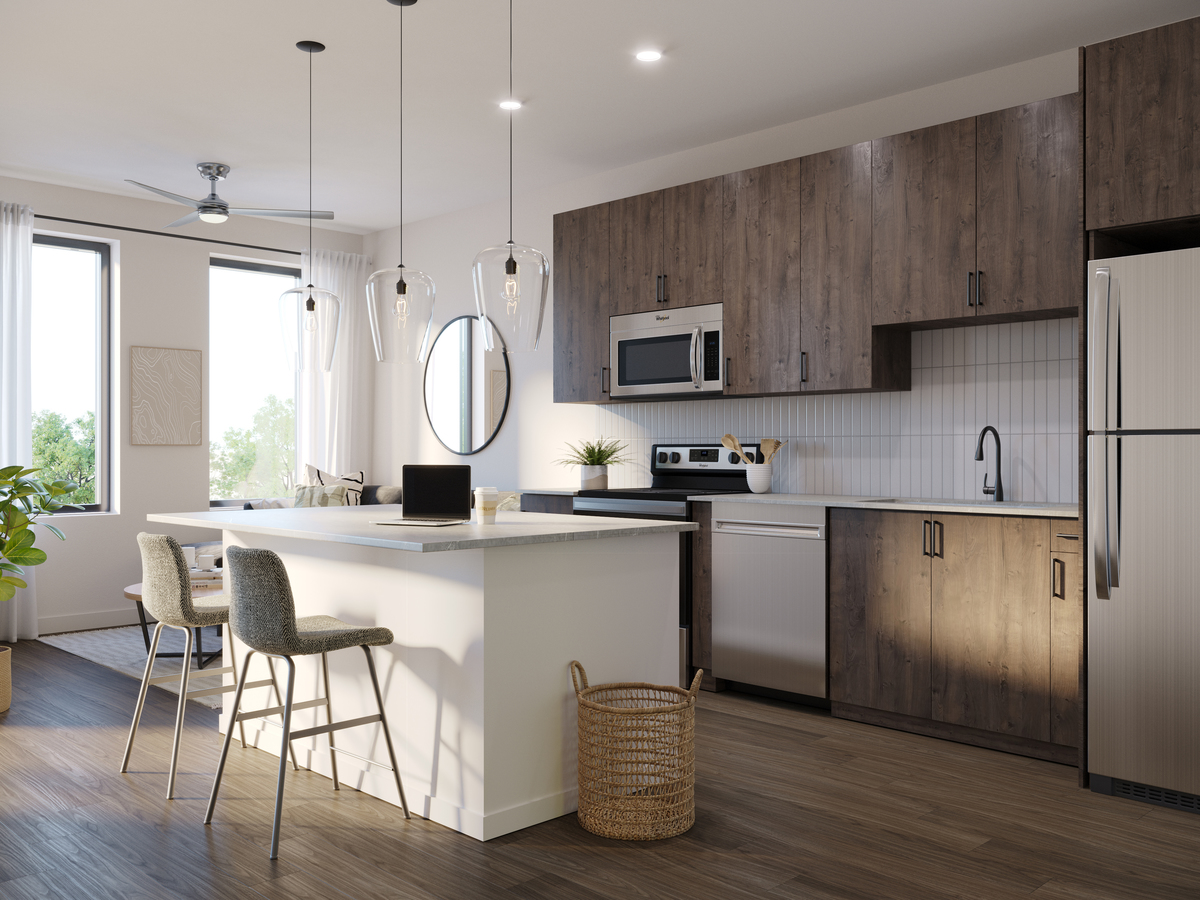
Read Next: 8 Tips to Saving Money on Student Housing Apartments in Columbus, Ohio
3. How much do utilities cost?
When choosing a student housing apartment complex, it’s important to find out which utilities are included in your rent and which ones you’ll need to pay for separately. This will help you budget more accurately for your monthly living expenses. If the student housing provider doesn’t know how much utilities typically cost, you can contact your local utility company for an estimate.
Read Next: How Much Does it Cost to Live near The Ohio State University?
4. How do you handle subletting?
Say you want to go home for a month or two to visit family. Or, maybe you have a job offer in another city. If you need to be away from Columbus for a few months, you may be wondering what to do with your apartment. You don’t want to break your lease, but you also don’t want to pay for a place you won’t be living in.
The solution is to sublet your apartment. Subletting allows you to rent out your apartment to someone else while you’re away. This can be a great way to save money on rent and cover your utilities.
Most apartment leases have a sublet policy that outlines the rules and regulations for subletting. Be sure to read your lease carefully before subletting, and make sure to get permission from your landlord.
Read Next: What Types of Housing Are Available for OSU Students?
5. What happens if I need to break my lease?
While nobody ever plans to break their lease, it’s a good idea to understand the process should you have to do so.
For example, you will typically have to pay a fee for breaking your lease, plus find a replacement. Sometimes, there is no fee, but you will have to find a replacement nonetheless. Other apartment complexes require a fee, but you do not have to find a replacement. Since the policy varies by apartment complex, be sure to ask your leasing staff what their policy is.
If you anticipate any upcoming life changes, like studying abroad or graduating early, signing a year-long lease might not be the best choice for you. Make sure you understand the penalties for terminating your lease early before signing.
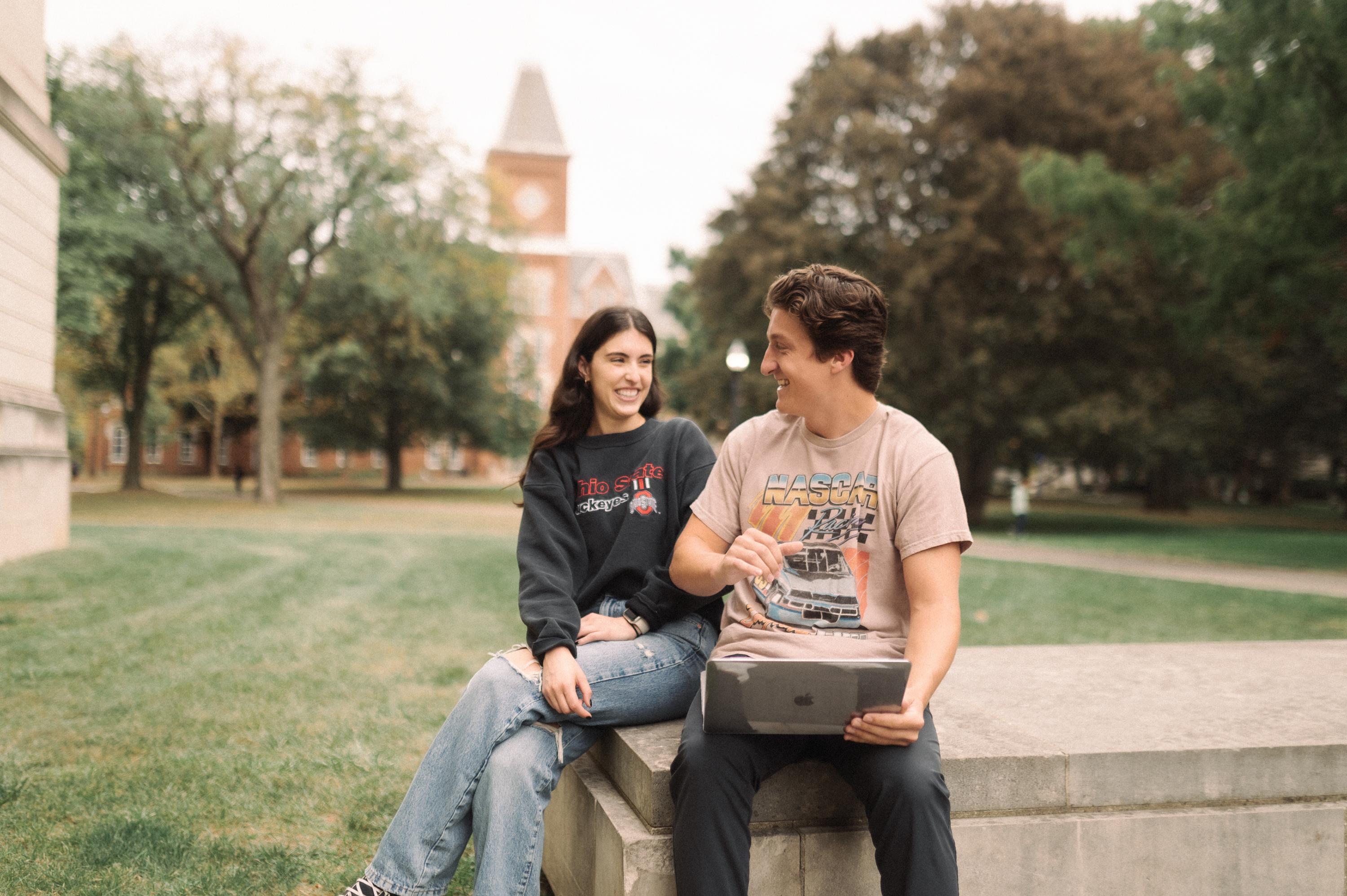
6. Are pets allowed? What is your pet policy?
Before you sign a lease, ask about the building’s pet policy. This includes whether pets are allowed, pet deposits, pet rent, and breed restrictions.
Here’s a breakdown of each point:
- Are pets allowed? Some buildings don’t allow pets at all, so it’s important to ask first.
- Pet deposits: Most buildings charge a one-time pet deposit to cover any potential damage caused by your pet.
- Pet rent: Some buildings also charge a monthly pet rent fee.
- Breed restrictions: Some buildings have restrictions on the breeds or types of pets allowed. For example, some buildings may not allow dogs of certain breeds or may have a weight limit for dogs.
7. Do you require renter’s insurance?
Renter’s insurance is an important aspect to consider during your apartment search. With renter’s insurance, you will have coverage for your apartment in the event of a fire, flood, theft, or other similar incident. Some rental insurance plans also cover injuries that occur within your apartment.
While renters insurance is always a good idea to have, some apartments require it. Additionally, some apartments offer rental insurance of their own for a small fee. This may be optional or required, depending on the apartment. When you’re touring, you’ll want to ask whether or not the apartment complex requires rental insurance, as well as whether or not they offer their own plan.
Read Next: 5 Benefits of Living in a New Student Apartment in Columbus Near OSU
8. How do I pay rent?
Most management companies offer several ways to pay rent, including online, auto-pay, and check. Auto-pay is the best option for college students because it helps you avoid late fees and gives you peace of mind. No matter how you choose to pay, make sure you know where your payment should go, who it’s addressed to, and when it needs to arrive.
9. How are repairs handled?
Even though everything should be in good condition when you tour an apartment and move in, it’s important to ask about maintenance procedures. Find out how emergency repairs are handled, whether maintenance is available 24/7 or only during certain hours, and what the average response time is. Understanding the maintenance process ahead of time will help ensure that any issues are resolved quickly and efficiently.
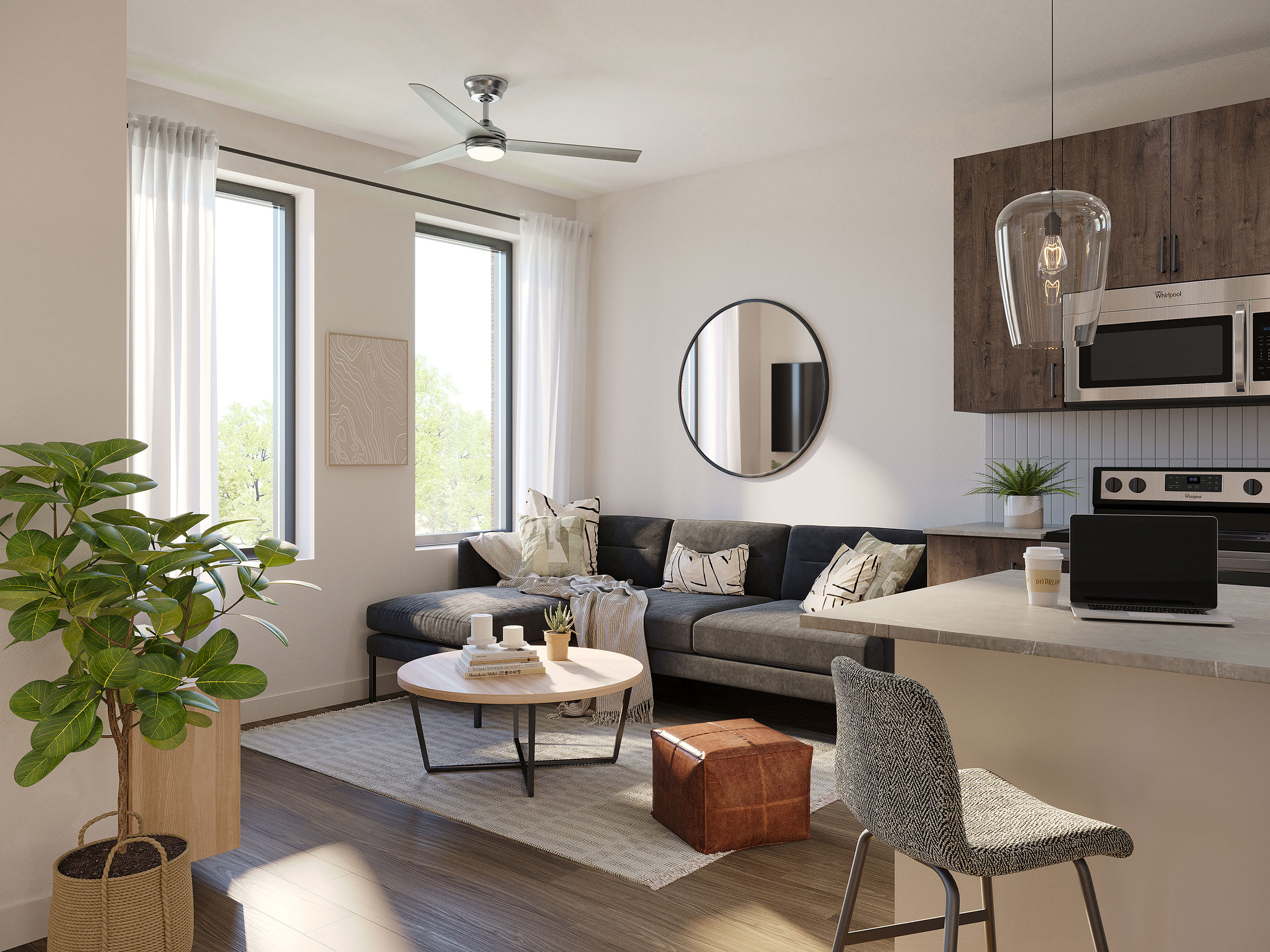
10. How secure is the property?
It’s important to understand what security exists at your potential new home. As you’re touring, ask your tour guide to discuss the building’s security features. You will want to know about both inside and external security measures.
Security measures the in the complex may have to include:
- A fob system
- 24/7 security
- Badge or phone entry
Also, if there’s a parking garage, determine how you will enter the building from it to make sure it is secure.
Within your apartment, your apartment may have:
- Deadbolt locks on the front door
- Individual bedroom door locks
11. How often does rent typically increase, and by how much?
At Ohio State off-campus apartments, it is common for properties to increase rent each year upon renewal of the lease. These increases aren’t always stated in the rental agreement, so make sure you ask how much you can expect to pay so that you are prepared if you decide you would like to live in the same apartment again after the end of your lease term.
12. Is parking available, and how much does it cost?
Parking is a top priority for students bringing a car to North Campus. In North Campus, street parking is hard to find and expensive to pay for, so you will need contract parking for the term of your lease. Renting an apartment that has a parking garage or has one nearby will be necessary.
At student apartments, a parking spot is typically an additional charge, be sure to ask the apartment you are interested in about the costs associated with parking.
At OSU, a garage permit costs between $1,008 and $1,025 per year. If your apartment doesn’t have parking (or is sold out), check out these other parking options in North Campus.
Read Next: Ultimate Guide to Parking Near the Ohio State University
13. Do you have roommate matching?
Looking to find a roommate? If you have decided that you want a roommate but you don’t have someone in mind, you’re in luck. Many student housing apartments in North Campus Columbus offer roommate matching. Through a quick survey provided by student housing apartment complexes, you will be paired with your ideal roommate match. If this is something you’re interested in, be sure to ask if the apartment offers roommate matching when you tour.
Free Download: Roommate Questionnaire

14. What expenses are due upon application, lease signing, and move-in?
On top of your monthly rental rate, most North Campus apartment complexes require an application fee, an admin fee, and a security deposit upon move-in or lease signing.
- Application Fee: An application fee is generally a non-refundable, one-time fee that covers the cost of the background checks to approve your application, including the screening of a guarantor.
- Admin Fee: An admin fee is generally a non-refundable, one-time service fee for administration, billing, bill auditing, overhead, and similar expenses and charges to be incurred by the apartment complex throughout your lease. This is typically paid upon the signing of your lease.
- Security Deposit: A security deposit is typically refundable, and will be returned at the end of your lease term so long as there is no damage to the apartment beyond typical wear. Your security deposit is typically due upon move-in but differs by apartment complex.
15. Do I need a guarantor?
If you are a full-time student who does not work or only works part-time, you will likely need a guarantor. A guarantor is someone who co-signs the lease and is responsible for any rent payments that you cannot or do not make. Some Columbus landlords do not accept tenants who are undergraduate students unless those tenants have a guarantor, so be sure to ask whether you need a guarantor and how the co-signing process works.
Read Next: What is a Guarantor?
We hope this article helped you understand which questions to ask when touring an apartment in Columbus! Touring is an exciting step in your journey to finding student housing, and it’s important to be sure to ask questions to ensure you’re getting everything you want out of your future home.
For more information on student housing apartments in Columbus, contact the Rambler leasing team, who are happy to answer any questions you may have about leasing an apartment near OSU. Want to learn more about Rambler? Visit our amenities and floor plan pages.


